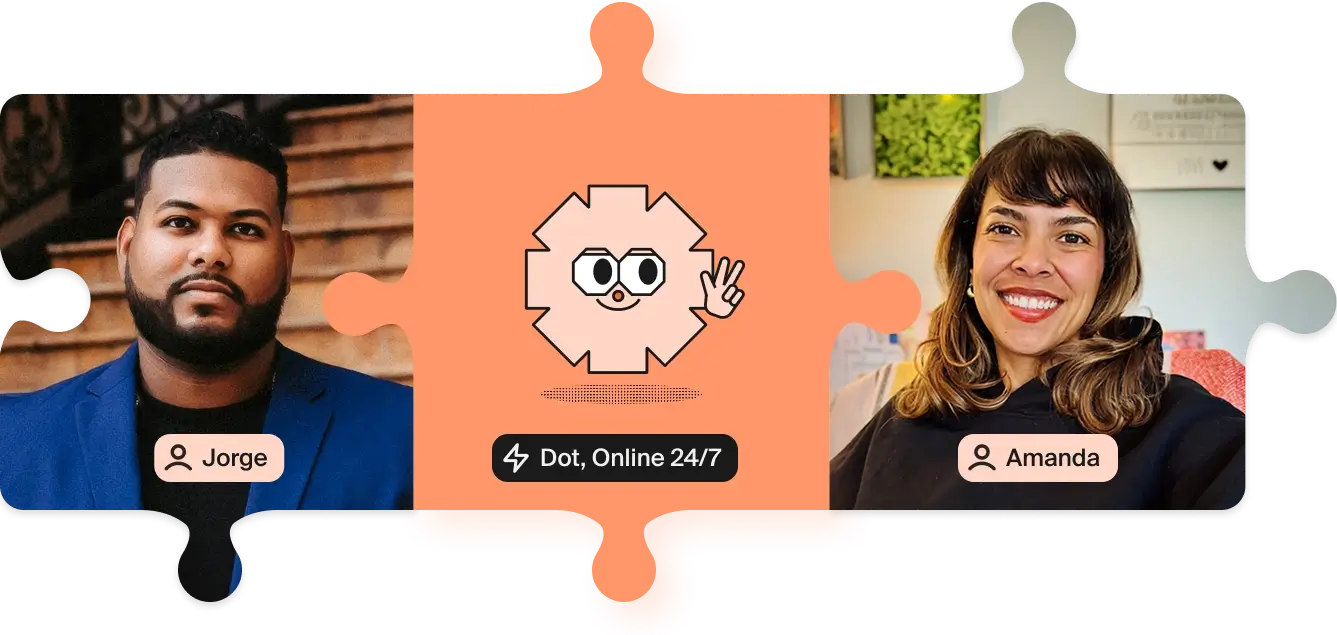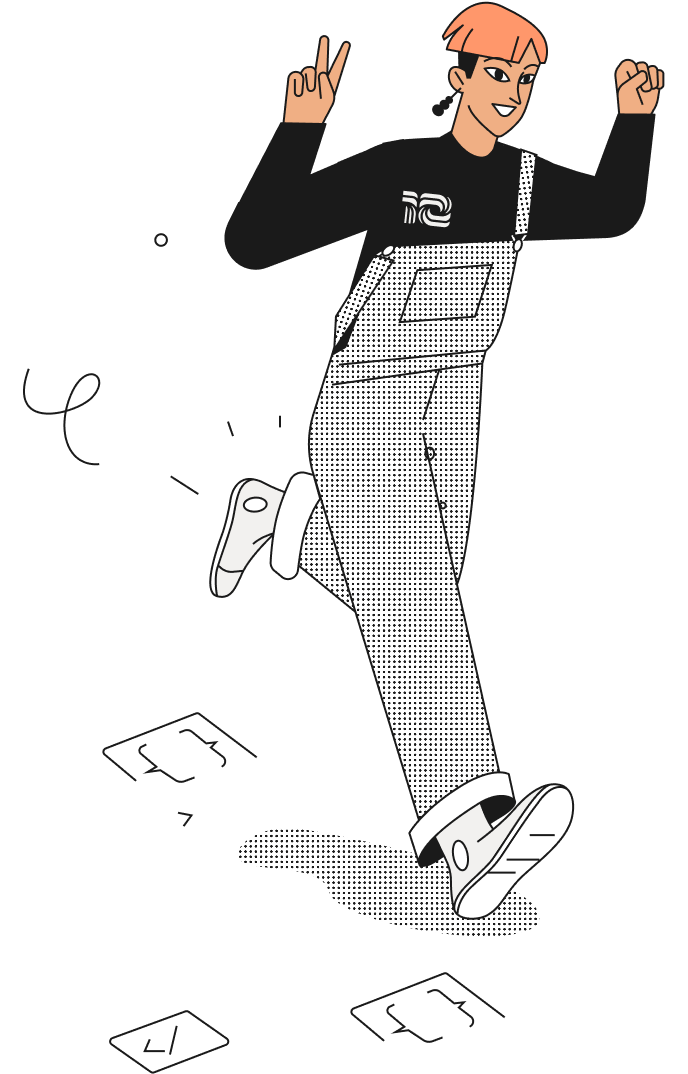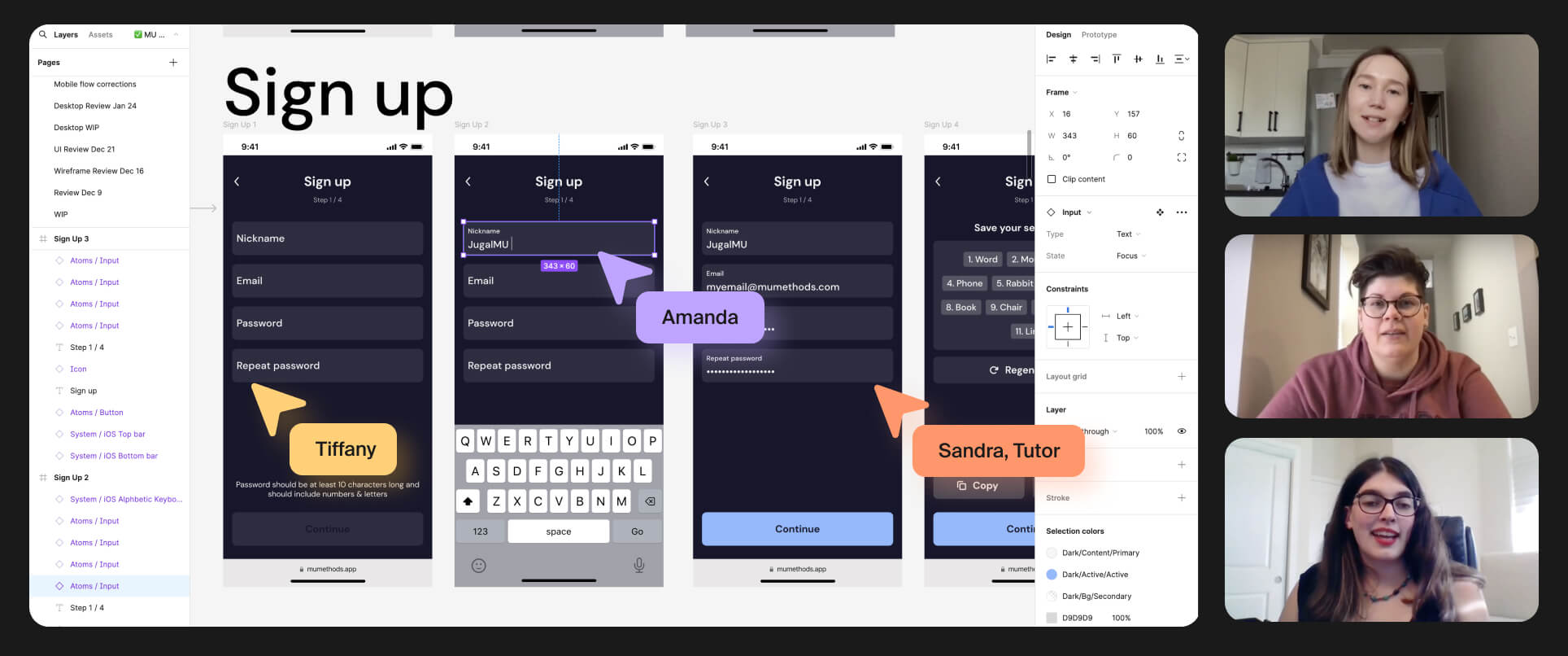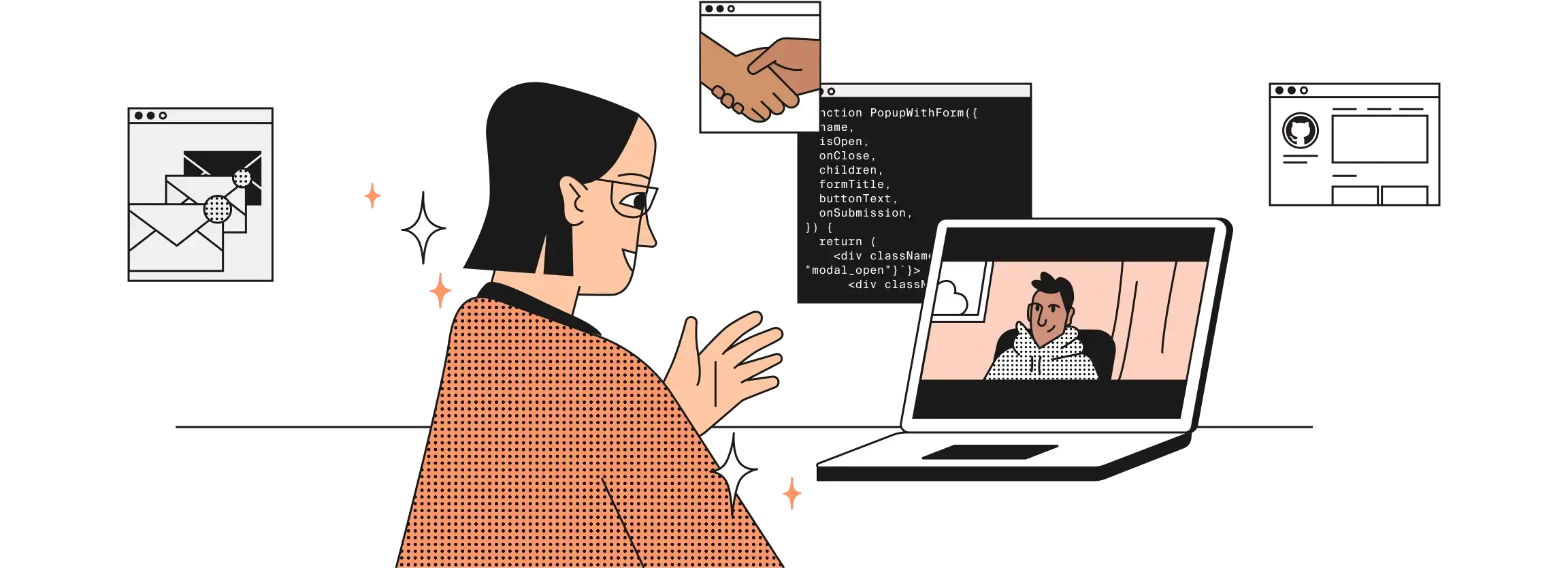UX/UI Design Bootcamp
Join our 5 months part-time User Experience/User Interface Design Bootcamp to earn ~$65,000 remotely in your first job after graduation

Online training and support designed for your real life
job in tech or 100%
money back*
background needed!
2.1k+ reviews
*Get a relevant job in 10 months or your tuition back when you complete our included Career Services package and make a good-faith effort to find a job. Details in our Terms of Use.
A creative position working on the human side of tech
UX/UI Designers determine how we interact with our digital world. They create the user-facing sides of apps, websites, and enterprise software. They don’t code or crunch data. Instead, they use empathy, researching user needs and user behavior to make digital products that are fun and intuitive to use.
The real world, hands-on training you’ll get at TripleTen’s UX/UI Design bootcamp will position you to start strong and grow. UX Design is a creative career track with solid entry-level pay and excellent growth potential.

Where can your UX/UI Design Bootcamp training take you?
The UX/UI Design career
path offers solid pay, with
a high income throughout
You after TripleTen



How you get a new career
in 5 months:
Our grads get great jobs with both startups and industry giants
UX/UI curriculum
2 weeks
insights
Design Fundamentals
Sprint 1. UX/UI Design Foundations and Design Thinking
This immersive sprint will introduce you to the UX/UI design process and fundamental principles of design thinking while you explore Figma's foundational tools. You’ll establish a solid understanding of how each phase of the design process contributes to a complete, user-centered project.
Additionally, you’ll explore how to create inclusive experiences that prioritize user needs using principles of accessibility, ethical design, and inclusivity. You'll develop confidence in applying these principles to real-world design challenges, fostering a deep understanding of the user-centric and inclusive mindset that drives successful design solutions.
Learning Outcomes
- Identify the phases of the design process and their role in achieving successful design solutionts
- Demonstrate foundational Figma skills by focusing on key tools and interface navigation
- Evaluate the importance of accessibility, ethical design, and inclusivity for user-centered design
UX Research
Sprint 2. UX Research Methods
Effective user research is the cornerstone of user-centered design. In this sprint, you'll explore various UX research methodologies and skills, such as user interviews, usability testing, card sorting, and user surveys.
You'll learn to plan, conduct, and analyze these research activities to gather valuable user insights and validate design decisions. Through practical exercises and case studies, you'll develop the skills necessary to uncover user needs, behaviors, and pain points, laying the foundation for creating successful user experiences.
Learning Outcomes
- Differentiate between qualitative and quantitative research methods
- Identify key elements of a project brief
- Plan and conduct effective user interviews and contextual inquiries
- Derive actionable insights and recommendations from research findings
Sprint 3. User Personas and Journey Mapping
Developing a deep understanding of your target users is essential for creating user-centric designs. In this sprint, you'll learn to create detailed user personas based on research insights and data. Additionally, you'll explore techniques for mapping user journeys, identifying pain points, and uncovering opportunities for design improvements. By creating these powerful tools, you'll be able to effectively represent and communicate user behaviors, goals, and needs to stakeholders, ensuring that your design solutions are tailored to the specific needs of your target audience and business goals.
Learning Outcomes
- Create detailed user personas based on research insights and data
- Map out user journeys and identify pain points and opportunities
- Utilize personas and journey maps to inform design decisions
- Communicate user insights effectively to stakeholders for aligned user needs and business goals
Sprint 4: User Flows and Information Architecture
Designing intuitive and user-friendly experiences requires carefully crafting user flows and organizing content and features into effective information architectures. This sprint will equip you with the skills to design optimal user flows for various scenarios and create information architectures aligned with user mental models, which is crucial for building centered digital experiences.
Learning Outcomes
- Examine the impacts of information architecture on user experience and product success
- Identify and organize content and features into effective information architectures
- Explore key principles for designing effective search interfaces for intuitive content discovery
- Design optimal user flows and structures that align with user mental models for optimal usability
UI Design
Sprint 5. Wireframing and Prototyping
In this sprint, you'll master essential wireframing and prototyping techniques using industry-standard tools like Figma. You'll learn how to create detailed wireframes and interactive prototypes that effectively communicate design concepts and facilitate user testing. Through hands-on exercises, you'll develop the ability to iterate designs based on user feedback, ensuring your solutions are user-centric and validated.
Learning Outcomes
- Create detailed wireframes and interactive prototypes
- Conduct usability testing with prototypes
- Iterate designs based on user feedback and testing insights
- Communicate design solutions effectively through prototypes
Sprint 6. UI Fundamentals
In this sprint, you'll explore essential UI design principles, including grids, layouts, text hierarchy, typography, color, and contrast. You'll learn techniques for consistent UI design through style creation and organization in Figma to ensure visually engaging, user-friendly, and professional-looking interfaces. Additionally, you'll explore interactive component design and responsive design principles, enabling you to create smooth transitions, and visual cues that guide users through your interfaces while ensuring layouts are adaptable across different screen sizes.
Learning Outcomes
- Determine how UI design decisions impact visual appeal, readability, and user experience
- Create and organize styles in Figma to ensure cohesion across design updates
- Prototype interactive and animated interfaces
- Explore layout structuring techniques for multiple screen sizes
Sprint 7. Design Systems
Consistency is crucial in creating successful user experiences. This sprint will explore the principles and components of design systems, which provide a scalable and cohesive framework for designing and building digital products. You’ll dive deeper into various design system components, including typography, color palettes, buttons, icons, and design patterns. Additionally, you'll learn to create comprehensive documentation and guidelines for design systems, preparing you to understand and utilize design systems in future projects.
Learning Outcomes
- Understand the importance of a design system and its role in creating cohesive user experiences
- Identify the foundational principles and essential components of design systems
- Develop various components of a design system
- Explore best practices for design system documentation and guidelines
Advanced UX/UI Integration
Sprint 8. Branding & Motion Essentials
As designers, it's crucial to establish a brand identity to stand out among the competition. You’ll start by exploring how mood boards capture a brand’s unique tone, colors, and style. You'll learn to conduct competitor analysis for a defined and unique brand direction and create a brand language guide to inform design decisions. Through practical exercises, you’ll also gain a deeper understanding of motion design principles and how motion enhances user engagement and strengthens brand identity.
Learning Outcomes
- Recognize the role of brand identity in UX/UI design
- Construct a brand language guide based on mood board findings
- Explore motion design principles and micro-interactions
- Create a consistent and engaging user experience through cohesive design choices
Sprint 9. Design Handoff and Cross-Functional Collaboration
In this sprint, you’ll learn how UX/UI designers fit into different types of companies, from fast-paced startups to big in-house product teams. You’ll explore the key roles on a product team and how to understand project briefs and team workflows like Agile and Scrum. You’ll also dive into real-world collaboration skills: using tools like Jira and Notion, running sprints and feedback sessions, and preparing clean, organized files for developers. By the end, you’ll know how to hand off designs, follow platform guidelines, export assets properly, and run final design quality checks — setting you up to work smoothly on any professional design team.
Learning Outcomes
- Explain how different teams and companies organize UX/UI work
- Collaborate effectively with teammates and developers
- Manage design tasks using industry-standard tools
- Organize design files and prepare assets for handoff
In this culminating sprint, you'll apply the knowledge and skills acquired throughout the program to a comprehensive capstone project. You'll engage in an end-to-end design process, starting with user research and progressing through ideation, prototyping, and final design presentations. This hands-on experience will simulate real-world design challenges and provide you with invaluable practice in tackling complex design problems. You'll receive peer reviews and professional feedback, helping you refine your work and prepare for a successful career in UX/UI design.
Learning Outcomes
- Conduct user research and derive insights
- Ideate and prototype design solutions
- Iterate designs based on feedback and usability testing
- Present and defend final designs to peers and professionals
- Develop a portfolio-ready design case study
Final Capstone Project
In this culminating sprint, you'll apply the knowledge and skills acquired throughout the program to a comprehensive capstone project. You'll engage in an end-to-end design process, starting with user research and progressing through ideation, prototyping, and final design presentations. This hands-on experience will simulate real-world design challenges and provide you with invaluable practice in tackling complex design problems. You'll receive peer reviews and professional feedback, helping you refine your work and prepare for a successful career in UX/UI design.
Learning Outcomes
- Conduct user research and derive insights
- Ideate and prototype design solutions
- Iterate designs based on feedback and usability testing
- Present and defend final designs to peers and professionals
- Develop a portfolio-ready design case study
Free bonus course
for new students
Free
Computer literacy
“Not a tech person”? Don’t know a browser from an OS? Take this course to get up to speed! Learn how to use a computer and industry-standard apps so you’re ready to break into tech.
or pre-requisites.
Stuck? Instructors and our
AI assistant are here to help
Get instant hints from Dot, our friendly AI assistant, or connect with an instructor who works in the field you’re entering.

Build professional skills using industry-standard tools
The TripleTen online UX/UI Design bootcamp experience is designed for learning success—and achieving your goals

1-on-1 tutoring from industry professionals
Get your UX/UI Design skills from industry pros committed to making challenging concepts accessible—and helping you succeed

Get hired for a career-track role with our help
You won’t just learn how to do the job—you’ll learn how to break through your own doubts and get the job! Our career coaches will review your resume and portfolio and show you how to play the hiring game in a new industry.

Will I get a certificate?
Of course! It’ll look great on your resume and LinkedIn :-)

1,1k+ grads!
We have a lot of experience jumpstarting newtech careers

“I had a lot of great experiences with the tutors. Whenever I needed help, they were there.”
Full story
“I had a lot of great experiences with the tutors. Whenever I needed help, they were there.”
Full story4.8/5 across 2,100+ reviews on trusted platforms
Featured in

We believe that you’ll get into tech in 10 months. In fact, we put money on it.
The TripleTen money-back
guarantee is legally binding.
For details, please see our
Terms of use
We also have a fair refund policy
After starting our UX/UI Design bootcamp, you have 2 weeks to withdraw with a 100% refund. After that, you can get a partial refund on a transparent schedule. Check our Terms of Use for more info.
FAQ
Complete FAQWhat do you learn in a UX/UI bootcamp?
What do you learn in a UX/UI bootcamp?
In our UX/UI Design bootcamp, you’ll learn:
- Design thinking and user-centered design
- UX research and data analysis
- Wireframing and prototyping with tools like Sketch and Figma
- Visual design tools and concepts, including typography and color theory
- Front-end tools like HTML, CSS, and basic JavaScript
- Creation and testing of user flows and information architecture
- Responsive and adaptive design techniques
- Lean and Agile project management
- Ethical and inclusive design
What’s the difference between UX and UI design?
What’s the difference between UX and UI design?
A UX Designer has a more strategic role, dealing with the overall experience of using a product, managing the user’s journey through the product in different scenarios. A UI Designer is more involved in production, focusing on the specifics of the interface used to interact with the product.
Do I need prior design experience to join a bootcamp?
Do I need prior design experience to join a bootcamp?
You don’t need any design skills or experience to join our UX/UI Design bootcamp. Like all our bootcamps, it’s beginner-friendly, with the first two weeks devoted to design fundamentals. Even if you’re not particularly tech-savvy, all our bootcamps offer optional computer literacy and AI courses to get you up to speed.
What projects will I work on during this UX Design Bootcamp?
What projects will I work on during this UX Design Bootcamp?
In addition to all the hands-on tasks and learning projects throughout the bootcamp, you’ll spend your last 2 weeks working on a comprehensive capstone project. A perfect case study for your portfolio, the capstone project requires an end-to-end design process. You’ll start with user research and progress through ideation, prototyping, and final design presentations. This project simulates real-world design challenges and provides budding UX designers with invaluable practice in tackling complex design problems.
Will I earn a UX/UI design certification?
Will I earn a UX/UI design certification?
You will get a TripleTen certificate upon completing the bootcamp.
Can you get a UX/UI job with a bootcamp?
Can you get a UX/UI job with a bootcamp?
Starting a new career is what TripleTen bootcamps are for. We make sure that you graduate with skills, a portfolio, and the professional know how to get your first job!
Is a UX/UI bootcamp worth it?
Is a UX/UI bootcamp worth it?
We believe that our UX/UI Design bootcamp offers phenomenal value. For the cost of a (very cheap) used car, you get an industry-focused curriculum, 1-on-1 guidance, crucial job search support, and access to a thousands-strong alumni network. All you need is 15-20 hours a week, 5 months, and the dedication to finish the program and pursue your job search!
Is there any post-bootcamp support available?
Is there any post-bootcamp support available?
After you complete the curriculum, our career coaches will spend some weeks making sure that you’re prepared for the job search. Once you’re job-hunting, the career coaches check in regularly to help and keep you on track. They’ll also help you negotiate the first offer of your UX/UI design career, and help you settle into your new job.
What are the payment options available?
What are the payment options available?
Right now, TripleTen’s UX/UI Design bootcamp accepts upfront payments and installment plans.
Why is this UX Design Bootcamp relevant?
Why is this UX Design Bootcamp relevant?
This bootcamp teaches up-to-date practices of effective UX/UI designing, building your skills to become an adept interface designer. We provide career support services, including practice interviews and mentorship, to help you land a dream job. Our bootcamp is affordable, and tuition financing is available from vetted partners.
What are the professional backgrounds of students who take this course?
What are the professional backgrounds of students who take this course?
You don’t need a specific professional background to participate in this bootcamp and become a professional UX/UI designer. Previous participants come from professions ranging from data analysts to mechanical engineers and music teachers. Though they differ by career, they're united by the grit and motivation to put in the required work.
How does TripleTen tackle the skills gap between students with different backgrounds?
How does TripleTen tackle the skills gap between students with different backgrounds?
We provide a personalized teaching experience for students with an interactive platform that helps you learn at your own pace. Students can approach tutors and hold one-on-one consultations to learn effectively. Each student is assigned a success manager to keep them on track and ensure they’re getting the best experience according to their knowledge level.
Is this UX/UI bootcamp 100% online?
Is this UX/UI bootcamp 100% online?
Yes, this UX/UI bootcamp is completely online. You can learn from anywhere with a PC and an active internet connection.
How long does it take to complete?
How long does it take to complete?
This bootcamp holds for 5 months, ample time to learn the ins and outs of UX/UI and get a design certificate.
How does the admission process work?
How does the admission process work?
First, you’ll speak to our admissions team to find out everything you need to know about the UX/UI design bootcamp. If you’re comfortable with the program, you can register on our website and prepare to gain a lot of knowledge.
What is included in my tuition?
What is included in my tuition?
The cost of this UX/UI bootcamp covers 5 months of learning, career coaching, and an externship placement to help you gain experience. We offer a money-back guarantee if you don’t land a job within 6 months of completion, proving we’re dedicated to helping you succeed.
How do the tuition payments work?
How do the tuition payments work?
You can pay the tuition price either upfront or in 5 monthly installments.
Is the UI and UX job market oversaturated?
Is the UI and UX job market oversaturated?
The UX/UI design job market is crowded, but this bootcamp helps you stand out by providing practical experience and knowledge. This experience goes a long way in advancing your career and provides many other long-term benefits.
Is a UX/UI bootcamp enough to get a job?
Is a UX/UI bootcamp enough to get a job?
Our UX/UI bootcamp provides the required knowledge and experience to get a job, but you also have to put in considerable effort to be valuable to employers. That’s why we don’t focus on knowledge alone. We also provide career coaching services to help you land a job and a money-back guarantee if you don’t get a job within 6 months of completion.
How many hours per day should I dedicate to studying UX/UI Designer?
How many hours per day should I dedicate to studying UX/UI Designer?
Our bootcamp requires 20 hours of weekly coursework, so expect an average of 4 hours per working day. However, we offer flexible learning options, so you’re free to tweak your schedule to make learning convenient for you.
How difficult is the TripleTen UX/UI Design Bootcamp?
How difficult is the TripleTen UX/UI Design Bootcamp?
The TripleTen UX/UI Design Bootcamp requires hard work but isn’t overwhelming. You can easily complete it if you’re motivated to gain valuable knowledge and experience in UX/UI design.
Will I need to study outside of class?
Will I need to study outside of class?
Yes, studying outside class helps you become a better-than-average UX/UI designer. Our bootcamp provides the required knowledge, but personal practice is essential to become an excellent UX/UI designer.
What happens if I need to miss a session?
What happens if I need to miss a session?
If you miss a session, you can contact your success manager to adjust your schedule within a nearby time frame. We take pride in offering flexible schedules that allow you to learn at your own pace.
Learn in a way that fits your life—anytime, anywhere—with constructive feedback and personal support!

Practice and improve your skills with design review and personal feedback from your tutors
Learn UX/UI Design the way you’d learn on the job—with detailed feedback and help from experienced designers!

Reach out to your learning coach to talk through any issues you encounter. Sometimes, we all just need to talk to someone...

You’re never alone—our tutors always have your back

Become a magnet for recruiters with a personal career coach and AI job-hunting tools

Get help and make progress whenever you study—whether at breakfast or 2am







unique with Dot—it adapts to
my learning style like a real
mentor.

instead of giving answers—
that’s how you really learn.

what I'm going to name my
next child...















